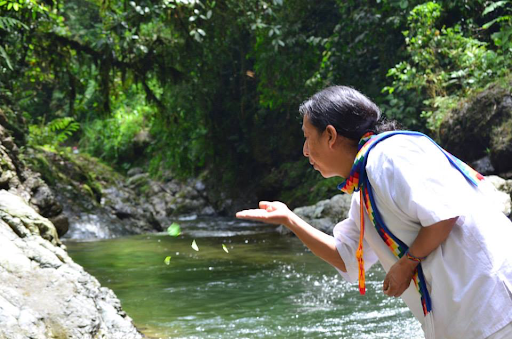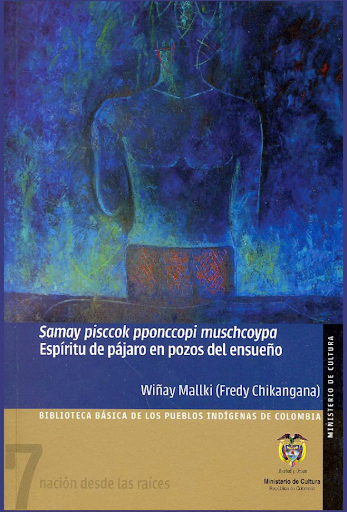Samay pisccok pponccopi muschcoypa / Espíritu de pájaro en pozos de ensueño © Fredy Chikangana. Bogotá, Ministerio de Cultura, 2010.
Translation from Spanish © Lorrie Jayne
If you prefer to read the PDF, please CLICK HERE
The literary work of Fredy Chikangana (Wiñay Mallki, root that remains in time) is fundamental in the history of contemporary Indigenous literatures from Abiayala (the Americas). His verses and essays mirror his life experience between community work and “walking the word” within cross-cultural spaces. From Chikangana, we have learned that “returning to ourselves” is always possible, and that the ancestral territories continue to speak the languages of the land, in this case: Quechua. With his flutes, poems and koka leaves in his chuspa (bag), Chikangana has shared his message of memory and unity from Chile to California, and from South Korea to Italy. Aware of the migrations of his Yanakuna Mitmak ancestors, his verses speak of chaskis (messengers), chakas (bridges), and exchanges. (Juan G. Sánchez Martinez)
Pachakay Pachakay callarinasha cusicuymanta huaccayripi causaypiy llaphllahuachai puka tukuna rumipi yana paypicay yupaychayniok cayiniyokmanta uku pacha huatanima nukanchi yawar waskakunawan huaymapacha. Pachachaipi phurupay tukanta ima huacaychina llimpikuna causaymanta yakucapay munainiyok ttukiri k ́apakpay yachikpayri tucuimanta quihuakuna ima pusapayayman ananpachaman ukupachaman nukansha callpawan mosccoykunamanta. Chaiman pacha quilluyana rinacay tullu jaika shimikuna pachamanta chhonccasca tarinakuna nuka tikramuna caimán llapllahua millma caimán, yakuman ima llancana aichakuna nukarina takiman kcaytacunapura huailla quihuachaymanta micjunapak mosccutucuy runakunamanta nuka tukuna kirushata uturunkumanta taqui tutakunamanta tinya uyhuamanta kenataquimanta tutaypachajahuaman ukupachapita urkujatunmanta.
The Earth
The Earth
the beginning of happiness and weeping
within her lives the red placenta
turned to black stone,
within her exist the rituals of the subterranean beings
that tie our blood
to the creeping vines of time.
Within that earth exists
the feather of the toucan
that keeps the color of life,
the free and restless water exists there
the aroma and taste of all the herbs
that carry us to heaven and hell,
we are there, you and I
with the strength of dreams.
Once the mouth of time has sucked them dry
our bones will go back
to that black and yellow earth;
we will return then to that placenta
to that feather, to the water that touches our bodies,
we will go and sing among the green threads of herbs
and feed the dreams of men.
Once again we will be the tooth of the tiger,
night’s poem, mare’s hoofbeat.
flute song in the deepest hours of night
within the depths of the great mountain.
Caykuna waskamanta sumaimana Chaipi huchuy llanta chincashcca runakuna tucunaq pishcupi illapay llimpirichakwan ninamanta jahuapi catanakuna wassimantakuna. Cahuapay puñuipay causaymanta pakaritamapak callpanchay ñanpay sonccopaywan pancalla achcallaquimanta. Ary huaquin utiykuna ashana japina tusuykuna millmacaymanta tutayakpi takipay mucmikuc ñaupakunamanta cachakuna richhaycunari runpanakuna ima llimpiana millmapaymanta kaykunashapay waskamanta sumaimana huarcurimakuna ananpachamanta kaima maipiman uraikuna huañukuna jahuinata tucuy mosccoykuna causaykunamanta.
Beings of the Tremendous Liana
In that lost little village
men turn into birds
light up with their fiery colors
above the rooftops of houses.
They look over the sleep of the live ones
so at dawn they might
revive the way
with hearts made light of so much sorrow.
If one were to ponder them
they would understand the dance of their feathers
in the darkness
the silent song
of ancient messages
and the circular forms
that flash like lightning from their feathers;
they are beings of the tremendous liana
that hangs from the sky
that the dead descend down upon
to paint the dreams of the living.
Takimanta pachakuna Saramanta nukamantaki yakumantari noqa samay. Kunantaki sarunhina paikunataki sinchina muyu ttillayaima huañuykuna. Ary suttuina ima micunakuna pacchakuna. Saramanta nukamantaki yakumantari noqa samay. Causay kunan tarpuymittawan cainamanta mishquikunawan atina hark ́aima huañuykuna.
Verses from the Earth
My verses are of corn
and my essence of water
I sing today as they sang before
like a strong seed that dodges death
As does the drop that feeds the fountain
My verses are of corn
and my essence of water
I live with yesterday’s seeding
with the sweet insistence that detains death.
Pacha takipa Saramanta takiy nuqapi yakuri samay Taki punchau ñaupakhina taki k’ullu sonccohima muyu ima nima huañushca suttuyhinamicjuchiy pucuycuna. Saramanta: taki, yaku, samai... Causay punchau tarpunahuancuna cayna-punchau trigo parhuayna poccoy ima sisay pachacunapi.
Chants from the Earth
My songs are of corn, of water my essence
I sing today as they sang before
like the stubborn seed that refuses death
like the drop that feeds the fountain
of corn: songs, water, essence…
I live today with yesterday’s seeding
like the ripe ear of corn that blooms on the earth.
Nukanchis kan causay pachacaypi Paykan cutanapaykuna quilluzarapay rumijahuapi nukanchistaquinakay quenawanihuan tinyacunari tarukamanta nukasinaiku shinkayanaiku manapacha nukachana intita rinaima urkupaypi; Nukasinaiku nukatusuikuni quenacunawan maquicunapura nukawan haku cahuirinahuan pachaukupimanta pupumaypi inlli cayanaima apanainukari yuyaycunaman pachayta Maipú nukausana huañushkuni nukachaskinakay cushiwan: «¡Nukanupiana!» niy taita Manuel «causaimari sarapay». «¡Nukanupiana!» niy mama Rosario «causaimari pachapay ima nukarupay». Shuyanan tusuykay jahuapi huachuncuna nukasinaiku takinakayri huañushkuwan quenaswan machanchinan llaquincuna antuchiwan mishkichinam tutacuna «¡nukanupiana llakimana! caparipay «ima nukancharinan causay pachaikay».
We Have Life on This Earth Yet
While they grind the yellow corn on the mortar
we sing with flute and deerskin drums
we laugh, and drink without haste
bid goodnight to the sun who flees through the mountains.
We laugh and dance, flutes in hand
go down towards the depths of the earth
by that warm umbilical that drags us toward
memory
towards that space where our dead ones live,
they welcome us with happiness
“Let’s drink!” says Grandfather Manuel, “and long live the corn.”
“Let’s drink,” says Mama Rosario, “and long live the precious land that warms us!”
And while we dance upon the furrows
we laugh and sing with our dead,
with our flutes we banish our sorrows
with chicha we sweeten the nights.
“Let us drink without shame!” they shout,
“We have life yet on this earth.”
Ninamanta Tutamanta kaimi urkuspiri punkucuna cay k ́anchachii chucchunari llinpipaywan ninamanta k ́atcukuna cunapay cahuana tocco huachuchaicaimi ima chacay tutayakuna rhupaypak sonkonukan runakuna huarmiri yanakunas ima cay runa ima cay yanapana pachapaipi tutapaimanta shimi, huaccay asiri yakushukpi cushnimanta sancju, ninapaypi sha callanapaipi callanapaipiri yana panccaykuna kokamanta muyuima runpanapi muyuina pachapay machupay hamk ́ay panccakuna nina-hasttik chaimanta apanasha pancakimsa shimicunaman mambiari cahuarayai usphakunaman ccocuy kimsa pancca yuyo ninfita yallinapay hauanta acchapaymanta «raquiycamay» niy, «paykuna munanapas mambiar» phutuy ninamanta kcaytashuk cushnimanta imakuna muyuy jahuapi uaikuna paykan upiana ñanpay ananpachaman; tapuna sunkupay payapaimanta «¿kayma niyman ninapay?» Tiyana chhinshuk paquinima jatapaywan llantankunamanta.
On Fire
Night falls in the mountain
Doorways brighten and quiver
with the brilliance of the fire
the cracks and windows are the lines
that cross the darkness to warm our hearts
The Yanakuna men and women
solidary beings in times of darkness
speak, cry and laugh in a river of thick smoke
Within the fire sits the clay basin
Within the basin of black clay
the little coca leaf spins in circles
just as time spins.
The elder toasts the leaf and stokes the fire
then brings three leaves to his mouth and
chews the coca looking down upon the ashes
he offers three tender leaves to the fire
passing them above his head
“We must share,” he says
“They, too, want to chew.”
A thread of smoke rises from the fire, takes a turn ´round the kitchen
as it makes its way towards the heavens.
Grandmother’s heart asks:
“What could the fire have spoken?”
A silence abides broken
by the crackle of dry kindling.
Yuyay yakuk Cuyak llakta yanacunas huañuk ñoccanchic shimi rimai purinam. Cuerpo yaku licha purina waiku yuyai huaira wiñay shuchuna. Ima yaravi ñampi ttica maythu quinquinam yaravi waikus pas urkus cay yanakuna quilla yachina inti k›uichi waiku runa.
Memory of Water
Throughout these lands
wander the voices of our deceased yanakunas
The river is their body-they walk with
the memory of water
trembling like a tree in the wind.
This is why I sing
that the flowers and pathways may sing
mountains and lakes
that the moon may know that I am Yanakuna
man of water and rainbow.
Quechua sonccoycaimi Purinaymi caranuqapi takipay pisccomanta hullilla tamiakuna pponccopay yakumanta chakracunapi runari ima purichiy puyu huaylluy. Quechua sonccoycaimi imaraykucaina tutakuna nuqapi huakyay imaraykukunan chekchipay hanapacha nuqapitapuy imaraykupaccarin katin taki jahuapi usphayaykuna. Quechua wairacaimi ima cheqquechiy kcaytakuna chakatana tutacunapi misterioninari. Quechua nimacaymi huarmimanta chaycama yuyai illaypicuna cuyaymantan manña tullpacunamanta... manña pachakunamanta manña ñankunamanta. Quechua iphupaycaimi paccarincunamanta ssimiri ñukanchimanta huañushca. Quechua sonccopaipi ima shaikuna pincuylluri tinyapura caballupaypi pachamanta sacha k ́apayhuan kiñiwa kamchari maipi rimay: ñukanchi maiki, ñukanchi cara, ñukanchi rimay, ñukanchi taki, ñukanchi atipacuk. Quechua pachamamacay caychayaqque. cunuyachinakuna llapllahuakuna ñoqari huachana pachaman shukpi minka atipanakuymanta killari wiñay.
Quechua is my heart
Within my body lives
the song of birds announcing the rain
the pool of water in the garden
and the man who passes by caressing the mist.
Quechua is my heart
for yesterday the night called me
for today the grey in the sky asks me
for tomorrow I will keep on singing
over the ashes.
Quechua is the wind that scatters the threads of the weave
in the mysterious night of candles and oil lamps.
Quechua is the silence of woman
while she dwells upon the absence of her beloved.
at the edge of the tullpa: the stones who keep the fire
…at the edge of the earth
at the edge of a path.
Quechua is the morning dew the voice
of our dead ones.
Quechua is the heart
that shakes between flutes and drums
in the neighing of the millenium
with the smell of kiñiwa
and roasted corn,
where we still say: our hands
our bodies, our voice
our music, our resistance.
Quechua is the earth mother
to whom we belong
who shelters the placenta
and delivers us to the world
in a minga* of struggle and permanent moons.
~~~
* minga: andean tradition for collaborative effort and community work.
For more about Fredy Chikangana / Wiñay Mallki
Samay pisccok pponccopi muschcoypa / Espíritu de pájaro en pozos de ensueño © Fredy Chikangana
Bird Spirit in the Wellsprings of Daydream © Lorrie Jayne ~ Siwar Mayu, November 2022



